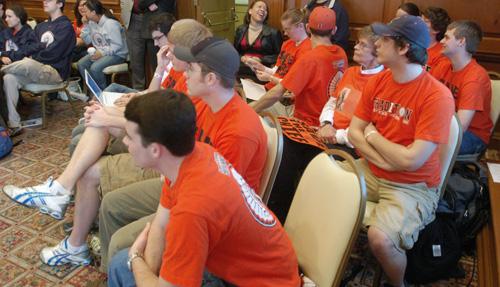Rise in student fees passed for Fall 2007

Students concerned about the future of Chief Illiniwek listen to the comments made during the Board of Trustees meeting at the Pine Lounge in the Illini Union Tuesday morning. ME Online
Mar 14, 2007
Last updated on May 12, 2016 at 08:51 a.m.
The University of Illinois Board of Trustees met Tuesday to discuss an increase in student, health insurance and housing fees on campus. Also on the agenda was the appointment of a new dean in the College of Fine and Applied Arts, the founding of a new school within LAS and a proposed library technology fee.
Fee increases included an 8.5 percent student fee increase at the University, which amounts to an additional $58 per semester. Health insurance fees through UIUC will not be increased; however, Chicago campus will undergo a 6 percent increase.
Undergraduate housing fees will undergo a 6.2 percent increase. With a classic 14 meal per week plan, the proposed room and board for a double in 2007-08 will increase $450 to $7,666. Rooms with air conditioning will be an additional $200. University graduate housing rates will also be increased.
Another proposal was a library-related information technology fee for University students.
Get The Daily Illini in your inbox!
Full-time students would be assessed $200 and law students would be given a $250 fee per semester.
The fee would aid digitization, increase hours and improve information technology within the library system. The fee will be phased in, meaning that incoming freshmen will be the first to be charged.
Student Trustee Chris Kantas said having direct student input concerning the distribution of accrued funds is essential. He said students also want to see visible improvements, citing the upcoming renovations to Foellinger Auditorium and Gregory Hall of which he has been directly involved.
Kantas said that it is difficult for students to pay these fees every year. However, he added, after this round of increases, the trend should taper.
In regard to the fee increases, Herman noted that the University has been able to attract the same demographics even while doubling tuition over the past five years.
He added that the socioeconomic status has largely remained the same over the time period due to what the University has been able to do with scholarships.
To President White, all of these changes are a part of a larger plan.
“We are a great university that is forever renewing itself,” White said.
The Global Campus Initiative remains a concern for the board.
According to the proposal, a chief executive will lead the program. The funding for the plan will be budgeted and accounted for as a separate unit, at $750,000 per year in fiscal year 2007, 2008 and 2009. The resolution will institutionalize the program and also pass the mission plan, said Eppley.
When Trustee Sperling voiced concern about the quality of education offered through Global Campus, President B. Joseph White said the administration has learned everything it can by planning, and it must now learn by doing.
Chancellor Herman emphasized the “democratization of learning” that Global Campus offers. Herman said that he thinks the principal behind Global Campus is great, but the particulars are yet to be determined.
Trustee Dorris moved to table the issue; however, his motion was denied and the resolution and mission plan subsequently passed.
The proposed LAS school is the School of Earth, Society and Environment. It would house the departments of atmospheric sciences, geography and geology. Although the board passed the proposal, the Illinois Board of Higher Education approves the formation of the school.
A number of professors were appointed to be a part of the Center for Advanced Study, including Paul J.A. Kenis, assistant professor of Engineering for work in fuel cells and Aida Xenia El-Khadra, assistant professor of Physics for work in high precision physics.
Robert B. Graves has been appointed dean of the College of Fine and Applied Arts. He will continue to be a professor of theatre. Graves succeeds Kathleen F. Conlin as dean.
Before the board assessed these items, they were addressed by a number of speakers.
Robert Klemm, local family farm owner and member of Farmers Supporting Independent Agriculture, voiced concern with the University’s farm management.
“The University is a key voice and example as one of the key agricultural centers in this nation,” Klemm said. The school drives the market in central Illinois, and its current high cash-rent rates for University owned acreage is sowing animosity within the local farming community, Klemm added.
James R. Barrett, professor of history, said the University must take steps to ensure the quality of education.
Chronic state under-funding has led to the cutting of instructional budgets, Barrett said. This has lead to fewer TAs and the proliferation of graders who have a much less personal relationship with students.
“Serious students understand that they are being shortchanged,” Barret said.
In order to curb this trend, Barrett recommended state-level tax reform. The University would decline if it does not properly address this issue, he added.
Trustee Kenneth D. Schmidt, M.D., gave a presentation on the Illinois Bill of Health. He said that the state is racing towards a clinician crisis in 2020, due to a lack of physicians, dentists and the critical shortage of nurses. The University system ought to due its part to prevent this crisis, he added.
The Master Plan Update detailed the continued development on campus, and to continue the unity of campus architecture and landscape as it develops.
The updated items include the 240-acre research park area in the southwest area of campus, a retail assessment around campus and the University transportation district.





